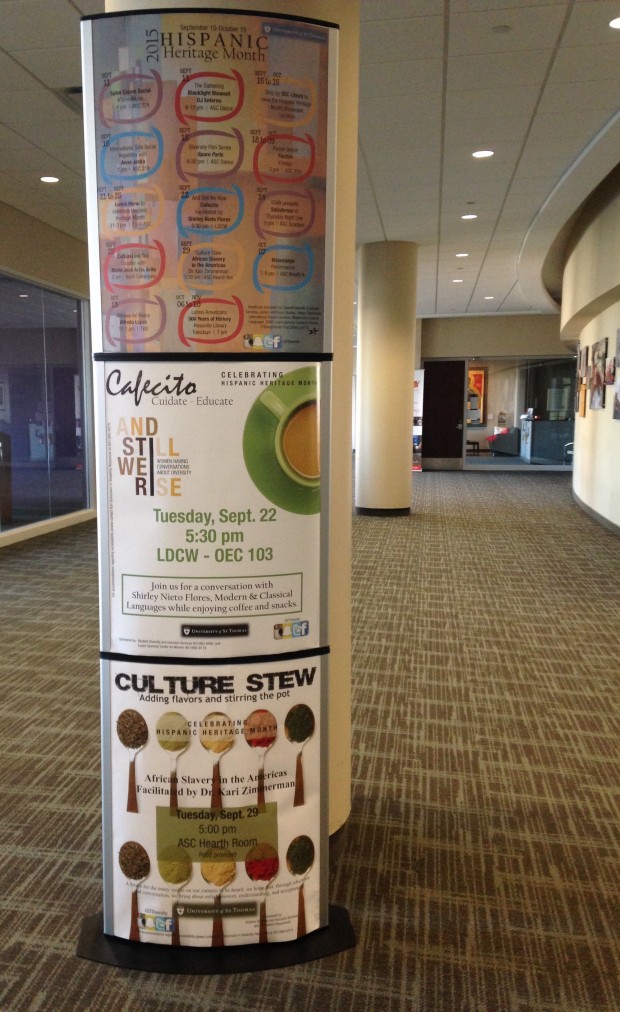
Student Diversity and Inclusion Services’ series of events called And Still We Rise aims to give women of color in the St. Thomas community a safe space to discuss diversity issues that affect them.
And Still We Rise started last year and occurs during heritage months. The first event of the semester will take place on Sept. 22 to celebrate Hispanic Heritage Month.
Jessica Gjerde, program director for education at SDIS, hopes the program provides women with a safe space.
“My hope is that, particularly for women, it is providing a space that has not existed before,” Gjerde said. “There are spaces for women on this campus, but I think this is really the first time that a space has been given specifically for women of color to talk about what they’re experiencing.”
Junior Emma Kopp is a student worker for the Luann Dummer Center for Women, where the event is being held. She agrees that And Still We Rise has been valuable for woman of color on campus.
“It creates a space where it’s not only safe to ask questions, but it’s also safe to explore and express frustration, anger, support and encouragement,” Kopp said. “That’s really important to have in a community because progress can’t happen without dialogue.”
The program started last year and has grown from just a handful of faculty, staff and students to around 50 attendees. Gjerde said having faculty and staff in the program with students has benefited the conversation.
“A lot of times faculty can bring in that theoretical knowledge (and) the students have their lived experiences that they’re sharing,” Gjerde said. “So I think it’s really enriched the conversation.”
The program isn’t just for women; some men, such as SDIS program intern Zander Tsadwa, have joined the conversation too. He agrees that the events can benefit everyone.
“(SDIS) does a really good job of covering issues in a way that would be relevant to anyone that would show up,” Tsadwa said. “So even though the focus of And Still We Rise are female issues or women’s issues, there’s always some element of intersectionality there.”
He also believes that learning about the issues women face has helped form his opinions.
“I guess it just reinforces the idea that social norms, roles (and) expectations influence one another, and it doesn’t help to talk about womanhood or femininity without considering other parts of a person’s identity,” Tsadwa said. “There’s a lot I should at least be cognizant of before I start talking about feminism or even having an opinion on it. I usually come away knowing something else and then knowing that there’s more to know.”
Kopp likes that the events are centered around empowering women and discussing the issues they face on a daily basis. She said this is especially important at St. Thomas.
“(It’s) something that is really important to me personally, but also should be important to UST, an institution that’s historically white [and] male-centric,” Kopp said. “These spaces give women of color and other people of color a chance to be heard and express their experiences in a community that isn’t always willing to listen.”
So far the program has been led by faculty and staff, but Gjerde hopes to have students get more involved and eventually lead the discussions.
“My dream for the program is that eventually we’ll have students as facilitators,” Gjerde said. “I think you gain much more hearing from your peers and their experiences than you do us talking to you all the time.”
Regardless of future plans, Gjerde is happy with the program and wants attendees to feel safe sharing their stories and to learn from each other.
“Well I hope they’ll feel first of all a sense of belonging,” Gjerde said. “I’m hoping that after the event, folks, regardless if you identify as Hispanic or not, will have a deeper appreciation for Hispanic Culture and will have felt more connected to their own stories.”
Simone Cazares can be reached at caza8656@stthomas.edu.

